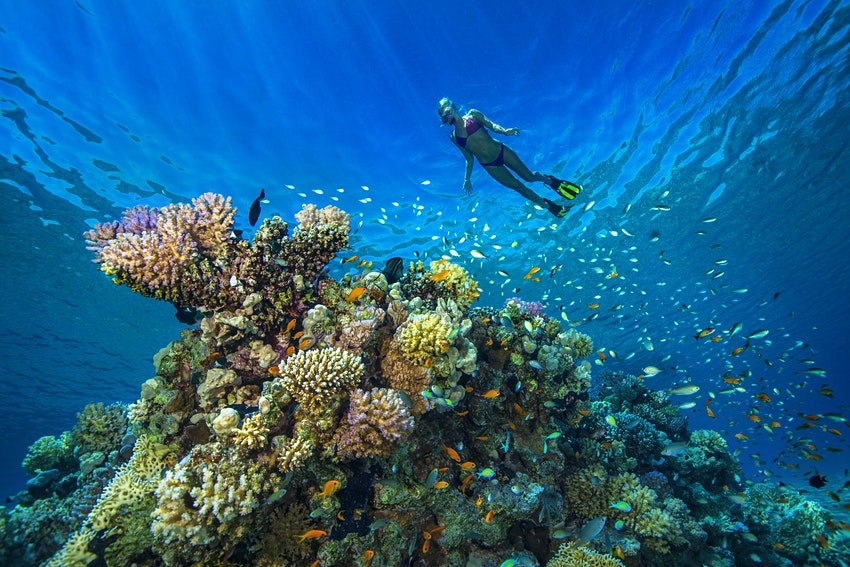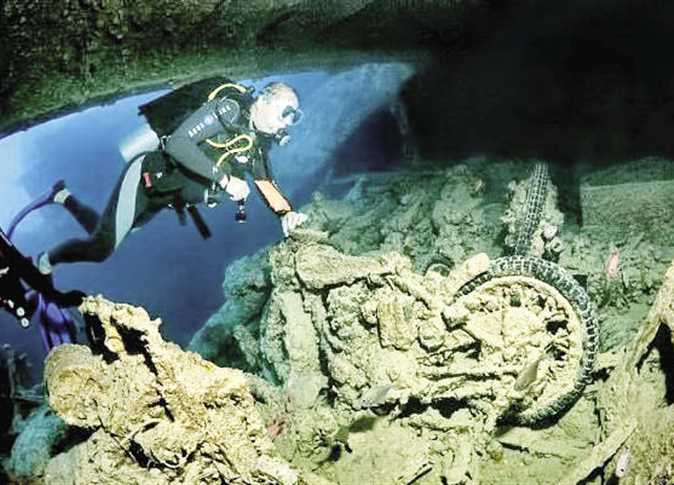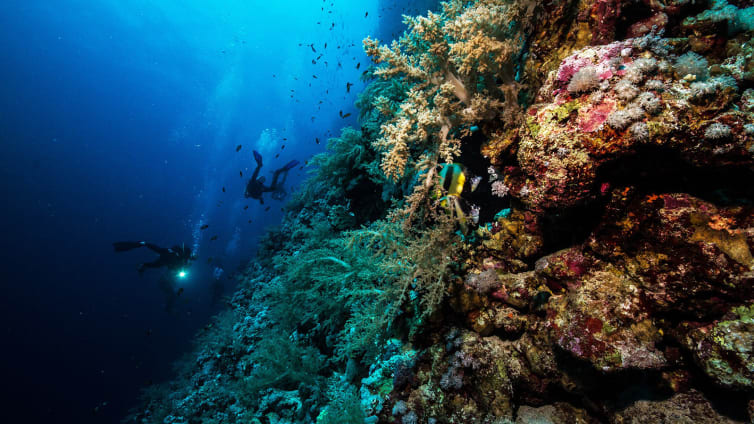
Pascal Bernabe arrived in Dahab last week to train technical divers who venture more than 150 meters deep. With a world record dive of 330 meters under his belt, he’s gone more than twice that distance. Bernabe reflects on his relationship with the deep ocean, its effects on the psyche — and even eating underwater.
Egypt Independent: When did you start diving?
Pascale Bernabe: I started diving when I was 19 years old here in Egypt, between Nuweiba and Dahab. I was on holiday, and thought maybe it was the occasion to try diving. I felt it was the right place, and so I made a dive. It was like falling in love.
EI: Is diving interesting to you as a sport, a kind of a spiritual journey, or as self-discovery?
Bernabe: Everything together, all these reasons. But first, I just wanted to know what it was like to be underwater, to breathe through something, to discover a new world, since it’s completely different.
EI: And what did you discover?
Bernabe: From my first dive, I understood that I had found my passion. So whenever I had free time, I’d come to Egypt and dive in Nuweiba, Dahab, Sharm el-Sheikh, Safaga,or Hurghada. I’ve started to dive in France around Toulouse and the Pyrenees mountains.
When I was in Egypt, I saw a picture of a cave diver, and it seemed very mysterious. I was fascinated by this picture. One of my colleagues at the primary school — I am a school teacher but I am on leave without pay — told me that he knew some cave divers. So, I met them and started diving with them, and realized that cave diving is my passion.
Cave diving is like being in space; one of the names for cave diving is inner space. It’s very quiet. It’s like being on the moon, but you are gliding between the walls, the ceiling, and the floor, so it’s a three-dimensional thing. There are several kinds of caves — small, big, narrow — and you adapt yourself and your equipment to each cave. You put your tanks behind you, next to you or you push them forward, depending on the size of the cave. You have to adapt yourself to each situation.
EI: How do you start exploring? You take all the equipment with you?
Bernabe: I take two tanks and I go for a first dive. If it’s deep then I stop at 40 or 50 meters and go back because of the depth. Then next time, I take more tanks, mix and rebreather [referring to the mix of gasses in the tanks], depending on how I see the first dive.
EI: While exploring new areas or caves underwater, have you ever done something wrong or underestimated the risks?
Bernabe: Yes, of course. In the beginning, when I started cave diving, I was exploring very quickly, and alone. I didn’t know many things and I didn’t know the right techniques. I was in a situation where the cave was too narrow, so I left my tanks. I lost them for a little bit, and I lost the line and other things.
EI: At such moments, how do you react? Do you panic? Do you control yourself? Do you go up?
Bernabe: I didn’t panic, but I was afraid. You know you cannot panic: if you panic you are dead. So, what’s very important is to exit, and think to yourself: “I am alive, I’ve done a stupid thing, I need to think about what I will do next time.” I was very lucky that time because I met some experienced guys who explained I should put the tanks on my legs because the cave is very narrow.
EI: When you discover a new cave, how are you credited for the discovery?
Bernabe: By writing an article and publishing it, taking photos, and drawing a map.
EI: When you go very deep, do you start hallucinating or go through any mental disorientation?
Bernabe: This could happen with deep air diving, with normal air — it also differs from one person to another. If you dive below 50 or 60 meters, you can have a ‘trip,’ like with alcohol or drugs. It’s not good technique to dive deep on air because it’s dangerous; that’s why we use helium when we go below 40 or 50 meters, to avoid narcosis. Some people start to sleep, some of them panic, some people become sad or happy. Most of the time, I am happy.
EI: You have gone as deep as 330 meters, breaking the world record in 2005. Could you explain how you did that?
Bernabe: In 1997 I dove to 240 meters in a cave for exploration, and I thought that I was 40 meters from the deepest guy. Jim Bowden went to 282 meters in 1994. I was really impressed. I started to go deeper: 270 meters, 300 meters. Then I had to find a good team, a good place, and sponsors because it’s a very expensive thing.
EI: How many people were on the team?
Bernabe: It was a small team, six people, and the Corsican team who helped us were also six. A team stages tanks in the right places underwater. They also check the equipment and bring food and water because decompression takes a very long time.
EI: You eat underwater?!
Bernabe: Eat, drink, read. The decompression for the record dive was 8 hours 47 minutes, so I can’t stay without food and water. You eat through a tube with milk and sugar inside, cream, mashed potatoes, or soup. It’s so boring, so I read some books or listen to music.
EI: How long was the record dive all in all?
Bernabe: Thirteen minutes for descent, and 8 hours, 47 minutes for ascent. That was normal: the faster you descend, the shorter decompression is. When I reached the depth of 330m, I felt nothing; one of my lights had been crushed because of the pressure, and my ear was hurt, so I had to ascend. I was used to going to 170 meters or 180 meters easily. At 240 meters it starts to be deep.
To be honest, this record was my worst dive! It was very interesting to plan, prepare, and analyze: what gases to mix, how to prepare my body, how to find a team, etc. Many people told me I was going to die, or it wasn’t possible. Of course it’s dangerous, but it was an obsession! I didn’t think about whether it was dangerous or not. I was sure I could make an attempt. I was not sure if I could make the record, but the day before the dive I thought it was completely stupid! I had been preparing for years and suddenly it was tomorrow. I was afraid.
It’s like being schizophrenic, or being two people: one normal, like everybody who thought it was stupid and crazy, and another determined person, thinking that I have to do it, it’s been my passion for years, I am well prepared, and I have a good team.
Twenty minutes before the dive, after we checked everything, one hose exploded, so we had a problem. Two of my team, who are experienced safety divers older than me, said we had to postpone it until tomorrow to have the problem fixed by professionals and not by ourselves. I was so scared, but me and another guy insisted we would do it then.
After that, cave exploration and wreck exploration are more interesting. I was happy to be alive, happy that it was finished, that I would see my family, my friends, and would drink some wine in the evening. Since my ear was hurt I knew I couldn’t dive for three months, so I thought I can relax, have fun, and vacation with my family like a normal person!
EI: Do you plan to break the record again?
Bernabe: No, and if you check the deep diving record, no one has done it twice.
This piece was originally published in Egypt Independent's weekly print edition.



